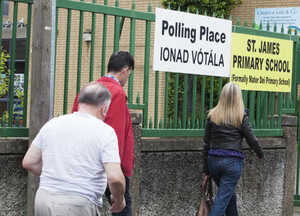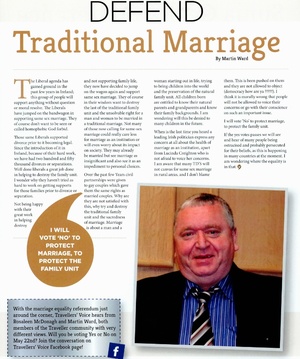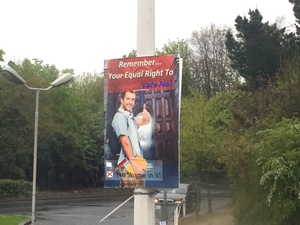Voting in last week’s referenda/ums in Dublin 8
Have we come over all ‘liberal’?
Or something else entirely.
Political Science boffin Professor Michael Gallagher, of Trinity College Dublin writes:
Did we see the emergence of a new voting pattern in Irish politics or did the familiar liberal–conservative divide raise its head once more?
Eyeballing the data certainly suggests the latter. Long-standing liberal bastions on the southside of Dublin were once again to the fore in voting
Yes, while the ten constituencies with a Yes vote lower than 55 per cent were the traditionally most conservative ones, in the west and north-west. Dublin voted 71–29 in favour while in the rest of the country it was a rather closer 59–41.
A more systematic analysis confirms this.
Comparing the percentage Yes votes on 22 May with those cast in the divorce referendum of 1995 produces a Pearson correlation (r) of 0.87, a remarkably high figure given the twenty-year time difference. (Constituency boundaries have changed since 1995, but by amalgamations we can identify 39 more or less comparable units.)
The largest ‘swings to liberalism’ were in traditionally conservative areas – Limerick West with a shift of 27 per cent, Cork NW and Cork E head the list – while the smallest swings were in relatively liberal areas (Dublin NE, Dun Laoghaire and Meath all saw the liberal vote grow by less than 5 per cent compared with 1995.)
Thus the Dublin-versus-the-rest difference narrowed in 2015: in 1995 the Dublin margin was 64–36 compared with 45–55 in the rest of country, a 19-point difference, but in the 2015 vote, as mentioned above, the difference was just 12 points.
In short, votes were cast very much along the established liberal–conservative dimension, with the liberal side now decidedly in the ascendant….
Gulp.
More here: On the same-sex marriage and presidential age referendums (Michael Gallagher, PoliticalReform.ie)
Meanwhile…
The fact that many Mass-going Catholics voted ‘yes’ (a substantial minority probably) is indeed a reality check for the Church.
The reality check is that the Church has done almost no catechesis in the area of marriage for years and years. It has done lots of pastoral counselling, but it has not taught on a systematic basis what marriage is and why it is so important to society and why it can only be between a man and a woman by its very nature.
It has not explained why this is not “exclusionary” but in fact protects the very basis and rationale for the institution.
The failure to teach in this way is why many Catholics were bowled over when the referendum came, especially as they have been subjected by the media to such relentless propaganda in favour of gay marriage for years.
Now that the referendum has been carried it is more imperative than ever that the Church teaches very clearly on the issue of marriage. It will need to contrast its belief about marriage with the State’s new version of marriage and make crystal clear to people why it believes what it believes.
The Church must always teach what is true both in season and out of season. Its teaching on marriage is now out of season. So be it. It must teach it all the same..
A ‘reality check’, but which kind? (David Quinn, The Irish Catholic)







Actually, according to Referendum Commission, plural for “referendum” in English language is “referendums” and not “referendas”.
I blame the internet.
Seriously.
i hate conservatives but I really hate liberals.
What does that make you? the smartest guy in the room?
The person who doesn’t understand what either ‘liberal’ or ‘conservative’ mean.
Johnney no-mates.
This reminds me: does anyone know of an online way one can access the results from all the polling stations in the various electoral areas of the state?
Interesting but unsurprising analysis. While all Dublin polling stations in the county’s electoral areas returned Yes majorities, the volume of Yes votes did differ somewhat. In my own Dun Laoghaire area, polling stations in the northern part of the constituency, Booterstown, Blackrock etc. with an older, more established population returned slimmer Yes majorities compared to the southern flank, i.e. Loughlinstown, Shankill etc. I’m not sure if there was a large class divide as mooted before the referendum as very well-heeled areas like Dalkey returned a large Yes majority while my own solidly middle-class Monkstown area was tighter.
From what I can garner from some of the rural counties, even if nearly all of them returned a majority Yes vote, there were invariably polling stations within them which returned No majorities although, a large amount with an admittedly a healthy Yes minority.
Maps guy got a job, unfortunately for us, well for him :)
I think you can – I remember a friend of mine who was heavily involved in the campaign telling me about it, but I was too busy being ‘merry’ Saturday afternoon.
some poor conclusions there.
Kildare North (part of “the rest”) had a higher Yes percentage than parts of Dublin itself, for instance…
Totally agree with this. My own Monkstown polling station, deep in the heart of well-heeled solidly middle class liberal south county Dublin returned a respectable but by no means run-away Yes result which paled in comparison to some Yes majorities returned by certain rural polling stations as far away as Clare.
The 5 highest (if memory serves) yes % were dublin areas. Obviously. Nothing in that article is surprising in any way
You say liberal, but I hear “communist”.
Scummy urban areas usually have a decent enough attitude to the gays. You can’t group them with conservative rural areas.
this analysis seems to ignore the enormous Yes votes delivered by working-class areas across Dublin (and possibly other cities too?). How does that compare to those areas’ 1995 votes? My sense is that there’s been a huge shift in voting for those areas, and that’s potentially of huge importance for the future political landscape.
I agree with David Quinn, the Catholic church should go on to teach its perspective on marriage, now emphasising its difference from the understanding of the mainstream of opinion and the state. Just as Islamic Imam’s presumably teach the Muslim perspective, pointing out its differences from mainstream or state views where differences occur, and Jewish Rabbi’s undoubtedly do the same.
Catholic is just one religion among many, serving its own discreet section of the general public who adheer, publicising its own versions of religious truth, and ideologically separated from the State.
I agree – then maybe even more people will realise how out of step Catholicism is with their own personal moral views.
I have no problem with people with deep faith but I find it troubling when people still claim to be Catholic without having darkened the door of a church in aeons. I think Irish people probably need to move away from describing themselves as Catholic and be more honest by using ‘ethnically Catholic’ or Christian.
I agree and disagree Lu. At the end of the day, people are free to describe themselves however they want. I agree, it is a bit ludicrous of people claiming to be a catholic and not really knowing what that means.
There’s no such thing as ethnically Catholic, that would imply there is something traceable in your DNA or something. My folks left the RCC behind long before I came along, they didn’t baptise us and never let us be exposed to it, so the cycle of Catholicism was broken. Do you mean more specifically “culturally Catholic”, or “have a Catholic upbringing”?
I would use “raised catholic” or “from a catholic background myself”. I never use “non-practising catholic” or “lapsed catholic” as I don’T consider I have any connection to it, I consider it something completely in my past (of course some sub-concious traces remain). I have never thought about “culturally catholic” because i don’t think it defines me too much, although it might more than I admit. I would say “culturally Muslim” though, to describe my largely secular Turkish neighbours. I don’t think they go to the mosque (that I know of), the wife and daughters are all modernly dressed but they observe things like Sugar Festival and voice common cause with other Muslim people (Palestinians, Syrians etc.)
I don’t observe Lent and voice sympathy for the Catholics of Austria.
“discreet section of the general public”
Should read “omnipresent section…” no?
no
That’s a crazy level of defamation right there.
David Quinn. Well known child murderer.
How comments like these are allowed I’ll never know.
That is a lot of words to say “Ireland is more liberal”. What a revalation!
So the yes vote wasn’t won through people deciding it was the right thing to do, but through propaganda and the church not explaining themselves. Seems kind of patronising to me.
Why can you just be a citizen of a republic, where some of your views are conservative and other views you have are liberal ?
I voted yes. I am not a liberal. I voted against divorce and would vote against termination for medical reasons (other than for fatal fetal abnormalities).
Indeed! Maternal mortality! Because it only right that a woman should be placed in mortal danger even when it could easliy be prevented…. Because God. Amirite?
People are more independent now. They’ll vote yes for things like same sex-marriage.
This is in no small way because of the kiddie fiddling and stranglehold the RCC had on our progress as a nation and Republic in the 20 century.
Conservatives in the uk are the wealthy home counties protectionist lot, they are perceived as the people you can trust with the economy rather than the crazy spend all liberals. ….. are we becoming more liberal ? Spend more tax less ?? That’s idiotic, liberals can’t be trusted with an economy .